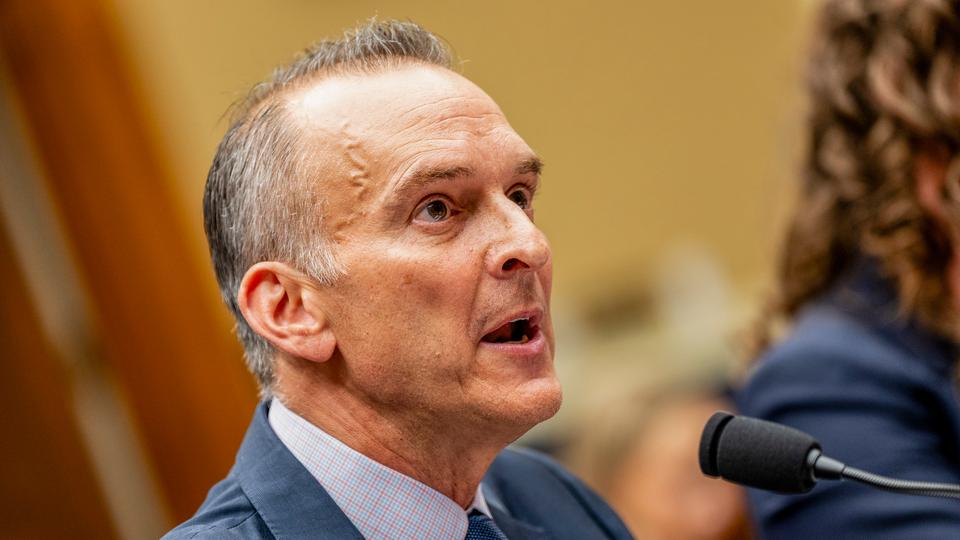
USADA acquittal raises questions New doping discussions about Paralympics star Townsend
USADA CEO Travis Tygart is the harshest critic of the World Anti-Doping Agency who cleared 23 Chinese swimmers of wrongdoing in 2021. During the ongoing Paris 2024 Paralympics, Tygart and the USADA will now have to answer uncomfortable questions about a recent doping case involving a prominent US athlete.
Roderick Townsend has been one of the stars of the Paralympics for nearly a decade. On Sunday evening, the 32-year-old American athlete cruised to gold in the high jump for athletes with upper limb impairments. It is Towsend’s third consecutive gold medal in the event, and on Tuesday he will have another shot at Paralympic glory. Townsend is one of the favourites in the long jump, an event he already won at Rio 2016.

Townsend’s presence in Paris however is controversial. Earlier this year, Townsend was cleared of wrongdoing by USADA after failing a doping test for the growth hormone stimulator campromorelin - despite his truly surprising defence. Now, new research by the ARD Doping Editorial Team is raising uncomfortable questions for both Townsend and USADA.
Syringe of dead dog used
After Townsend tested positive for capromorelin during an out-of-competition test in Arizona last November, Townsend denied knowingly doping to USADA investigators. Townsend stated that the source of his positive drugs test was pet medication that he had given to his sick dog Winnie.
Townsend said that he had administered pet medication to Winnie with an oral syringe, but then kept the syringe after his dog sadly passed away. He then used the syringe himself to take vitamin supplements. Unbeknownst to Townsend residues of Winnie’s pet medication remained in the syringe and caused him to test positive.
USADA accepted Townsend's defence and cleared him to continue competing with the Paris Paralympics on the horizon. “We of course questioned and investigated everything. We only found traces of the substance and the athlete provided certified documents from his veterinarian. We did what we had to do and based on the evidence, this was clearly a case of innocent contamination with an animal drug,” Tygart told the ARD Doping Editorial Team. The case did not go to independent arbitration because Tygart says the arbitrators would have obviously reached the same conclusion.

Townsend worked with supporters of doping substances
However, ARD research is raising doubts about USADA's decision. Social media posts show that Townsend was working with the fitness trainer Justin King, a former bodybuilder, shortly before he tested positive – King is a proponent of doping substances such as growth hormone and steroids, according to a video on his own Youtube channel.
"Growth hormone is actually an extremely beneficial thing [...] for a lot of different tissues in the body", said King. “It can be great, steroids, in terms of long-term and short-term effects.” King also says that WADA has unfairly demonised steroids. “They're not this god awful thing that's going to kill you,” King told his Youtube subscribers. “It's not like how like WADA makes it out to be.” When asked for comment by ARD, King curiously denied ever having said such a thing.
"Indications are not evidence”
According to an Instagram post, the ARD Doping Editorial Team has discovered that King once worked at a company that advertises therapy with growth hormone stimulators - the same class of substances that Townsend tested positive for, as per the WADA Prohibited List. King confirmed to ARD that he was employed at the centre as a fitness trainer but had no further association. Roderick Townsend did not respond to a request for comment.
The USADA boss Travis Tygart claims that his organisation were aware of Townsend’s “relationship” with King before they cleared the paralympic champion of any wrongdoing. The ARD Doping Editorial Team provided its findings to USADA. “That isn't necessarily fair to infer on someone when all the other evidence in the case, you know, points to a different direction,” said the USADA CEO. Tygart ruled out re-investigating the Townsend case.

Townsend case has a political dimension
USADA’s acquittal of Townsend, despite his unusual defence, and his relationship with Justin King, is indeed surprising given the ongoing dispute between USADA and WADA in relation to the Chinese doping scandal. In 2021, WADA accepted the results of an investigation performed by the Chinese Anti-Doping Agency (CHINADA), with the assistance of Chinese intelligence, which was allegedly able to establish that 23 Chinese swimmers failed doping tests after eating contaminated food in their hotel.
After ARD and the New York Times broke the story in April, Tygart became WADA's most vocal critic. Tygart accused WADA of a cover-up which has consequently led to a crisis of confidence in the global anti-doping system. Tygart however emphasised to the ARD that the Townsend cases is drastically different from the China cases.
WADA chose not to appeal
“We investigated it (the Townsend case). WADA did not investigate it (the China cases). They didn’t interview the athletes. And most importantly, they didn't announce the cases. They completely swept these under the carpet,” said Tygart. Tygart also stressed that WADA chose not to appeal USADA’s decision in the Townsend case.
What Tygart does not mention is that there was also an investigation performed by CHINADA in the Chinese swimming cases, albeit an investigation that ended with highly questionable findings, controlled by Chinese authorities with secret service powers. And Tygart is correct in his statement that USADA handled the Townsend case much more transparently than WADA and CHINADA did in the case of the 23 swimmers.

Roderick Townsend no longer cares about this controversy; he has nothing to fear and on Tuesday he will be aiming for his second gold medal of the Paralympics at the Stade de France.



